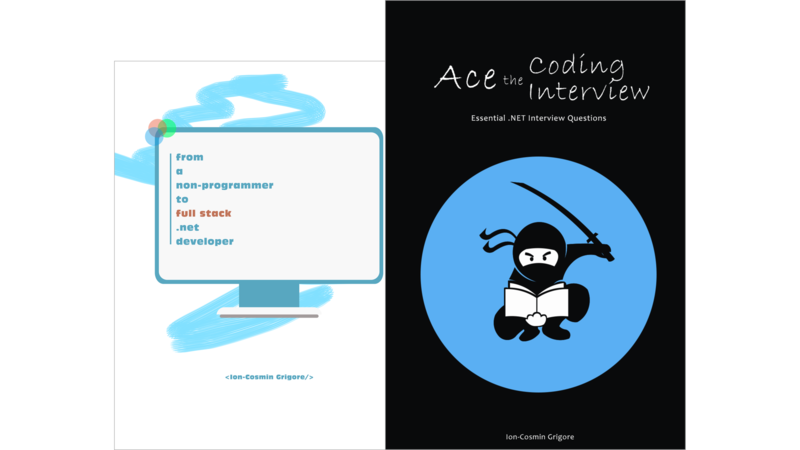Requirements: From A Non Programmer To Full Stack .NET Developer. 11
How to stand out: Top 3 Tips. 12
Before the interview: No Technicalities Yet….. 13
Contact phase: LinkedIn, Resume. 13
Different types of technical interviews. 13
But I don’t Have Enough Experience Myth….. 14
This Is What I Look For When Going To An Interview.. 14
This Is How I Usually Take Interviews. 15
How Is This Course Structured?. 16
.NET Interview Questions For Level 0 – Beginner. 17
OOP principles: Encapsulation. 17
OOP principles: Polymorphism and Inheritance. 18
OOP principles: Abstraction. 21
C# Basics: Class vs Object. 25
C# Access Modifiers: Public, Protected, Private, Protected Internal and Private Protected. 25
C# Loop Functions: While vs For. 30
C# Loop Functions: Do-While vs While. 31
C# Loop Functions: Continue vs Break. 32
C# Basics: Abstract Methods vs Virtual Methods. 33
C# Basics: What Is A Partial Class?. 35
C# Basics: What Is a Sealed Class? When you want to use it?. 37
C# Interfaces: Interface vs Abstract Class. 38
C# Interfaces: Access Modifiers. 40
C# Interfaces: Implementing 2 interfaces with same method. 41
C# Basics: Static vs Non Static. 42
C# Basics: Const vs Readonly. 44
C# Basics: Overriding vs Overloading (Contructor, Method, Operator). 45
C# Basics: Hiding methods (Inheritance). 48
C# Basics: Private Constructor. 50
C# Basics: Static Constructor. 52
C# Immutability: String vs StringBuilder. 53
C# Parameters: Pass by value. 54
C# Parameters: Pass by Reference. 54
C# Parameters: Ref vs Out (Differences and Limitation). 55
C# Basics: Boxing vs Unboxing. 57
C# Basics: Struct vs Class. 57
C# Exceptions: Throw Exception vs Throw.. 60
C# Exceptions: Can you have a try block without catch?. 61
C# Exceptions: Why to use finally block?. 62
C# Basics: What is an attribute?. 63
C# Basics: Practical Use-Cases for Closures. 65
C# Basics: What Is Caching?. 66
C# Generics: Classes Constraints. 68
C# Basics: Extension methods. 70
C# Basics: Anonymous Types. 71
C# Basics: Deferred Execution vs Immediate Execution. 76
C# Basics: What is a Stream?. 77
MVC: What Is A Controller? Class Vs Controller. 79
MVC: Model, View and Controller (who knows who). 80
MVC: ViewState vs SessionState. 81
XML: XML fragment vs XML document. 83
GIT: What does git push origin master?. 83
HTML: Why is it a good idea to split HTML and CSS?. 84
HTML: What is the difference between classes and ids?. 84
HTML: What is the difference between margin and padding?. 84
HTML: Does a hyperlink apply to text only?. 85
Javascript Basics: Session Storage vs Local Storage. 85
Javascript Basics: What is associative array?. 86
Javascript Basics: Use Strict in Javascript?. 87
Javascript Basics: Working of timers in JavaScript? Any drawbacks?. 88
Javascript Basics: Enumerate data types. 88
Javascript Basics: Define event bubbling in Javascript. 89
Javascript Basics: Javascript vs Typescript?. 90
Javascript Basics: Is Javascript case sensitive?. 91
Javascript Basics: Object Inheritance in JavaScript. 91
Javascript Basics: this keyword in Javascript. 93
Javascript Basics: What Is Ajax?. 95
SQL: Inner Join, Outer Join, Left join, Right join. 97
.NET Interview Questions For Level 1 – Intermediate. 100
POO Principles: KISS, DRY, TDA, YAGNI 100
POO Principles: Inheritance Access Modifiers. 101
C# Topics: Managed vs Unmanaged Code. 105
C# Topics: IL, CIL, MSIL, CLI, JIT. 108
C# Topics: Strong Typing vs Weak Typing. 109
C# Topics: Difference between a.Equals(B) and a == b. 110
C# Topics: Difference between early-binding and late-binding. 111
C# Topics: Diffrence between typeof vs .GetType()?. 111
C# Topics: LINQ vs Stored Procedures. 112
C# Topics: Can we use ‘this’ inside a static method in C#?. 112
C# Topics: Delegates, Multicast Delegates, Generic Delegates, Events. 113
C# Topics: Serialization (Binary vs xml). 117
C# Topics: Generic Classes Performance Improvements. 118
C# Topics: SQL Deadlock vs C# Deadlock. 118
C# Topics: What Is Reflection?. 119
C# Collections: Yield return. 121
C# Queries: List interfaces (ICollection, IList, IEnumerable). 122
C# Queries: IEnumerable vs IQueryable. 123
C# Multithreading: Thread vs Process. 124
C# Multithreading: Deadlocks (lock, semaphores, mutex) 125
C# Multithreading: SystemThread, ThreadPool, Delegate.BeginInvoke. 126
C# Multithreading: Send data between processes. 127
C# Multithreading: States of a Thread in C# - Unstarted, Ready, Not Runnable, Dead. 129
SOLID Principles: SRP, OCP, LSP, ISP, DIP. 129
C# Topics: What is DI? What is IoC?. 134
C# Topics: Dispose vs Finalize. 136
Design Patterns: What design patterns are used throughout .NET framework?. 137
HTML: What is a doctype good for?. 137
Javascript: Private Members inside a Javascript object. 138
Javascript: this keyword in Javascript. 139
Javascript: Types of errors in JavaScript - Load Time, Runtime, Logical 141
Javascript: What are true private methods in JavaScript? What is the drawback?. 142
Javascript: Methods to empty an array in Javascript. 143
Javascript:What is Function Hoisting in Javascript?. 143
.NET Interview Questions For Level 2 – Advanced. 146
C# Advanced: Garbage Collection Phases. 146
C# Advanced: Explain Query Comprehension. 146
C# Advanced: Covariance vs Contravariance + in/out keywords for generics. 148
C# Advanced: NET Remoting - Serializable Types, MarshalByRef. 149
C# Advanced: When would using Assembly.LoadFrom or Assembly.LoadFile be appropriate?. 150
C# Advanced: What are the benefits of a strongly named assemblies?. 151
C# Advanced: What are Expression Trees?. 152
C# Advanced: What is CI/CD? Explain the flow. 153
C# Advanced: Cloud vs On-Premise? Advantages vs Disadvantages. 155
C# Advanced: Can a thread have parameters?. 156
C# Advanced: Can we overload generic method in c#?. 156
C# Advanced: Chain of responsibility pattern vs decorator?. 158
C# Advanced: When would you use the builder pattern? Why not just use a factory pattern?. 160
C# Advanced: How can you stop a thread in C#?. 161

